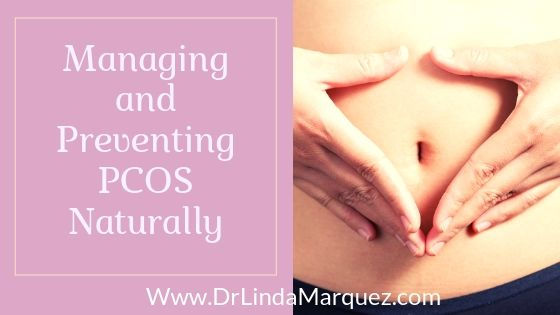Managing and Preventing PCOS Naturally
- Linda Marquez Goodine
- Jun 13, 2019
- 3 min read
Updated: Jun 21, 2019

Did you know that...
Polycystic Ovary Syndrome affects 15-20 percent of women in their childbearing age.
In the U.S. there are approximately 5 million women living with PCOS.
What is PCOS?
Polycystic Ovary Syndrome or PCOS is a hormonal disorder that typically affects women during their reproductive years.
Women who experience PCOS tend to have irregular cycles and can sometimes go months without a period, as well as have an excess of the male hormone, androgen.
It is common for the ovaries to become enlarged and develop cysts on the outer edges in addition to also affecting the ovaries ability to release eggs.
Therefore, women who have developed PCOS tend to have a more difficult time getting pregnant or carrying a pregnancy to full term. If left untreated or not well managed, long-term complications can include type 2 diabetes, heart disease, endometrial cancer, obesity, fatty liver (nonalcoholic), sleep apnea, miscarriage/premature birth, and anxiety/depression.
Symptoms
Many women first experience symptoms of PCOS in their teens around the time they begin their first menstrual period, although it can develop later on.
Symptoms of PCOS include:
-infertility
-irregular periods
-excess male hormone
-excessive hair growth/baldness or hair thinning
-low sex drive
-weight gain/inability to lose weight
-acne
-fatigue
-emotional conditions such as anxiety or depression
What are risk factors for developing PCOS?
-inflammation (due to toxin exposure, unhealthy diet, the body's inability to detox correctly, etc.)
-hormone imbalances (imbalances in other hormone systems in the body)
-insulin resistance
-genetic predisposition (family history of PCOS)
How can you improve or prevent PCOS naturally?
Once diagnosed, conventional treatment for PCOS include the use of birth control pills containing estrogen and progestin or progestin only therapy to help regulate periods, clomiphene (an anti-estrogen medication taken at the first part of the menstrual cycle), letrozole (a breast cancer treatment intended for use in helping stimulate the ovaries), and/or metformin (used to help improve insulin resistance/regulate blood sugar).
Unfortunately, medications can be ineffective and/or have undesirable side effects.
Therefore, it can be beneficial to apply natural strategies that not only have minimal, if any, side effects but also provide long term results.
Adapt an anti-inflammatory eating plan: because one of the major factors in PCOS is inflammation, you want to lessen the stress on your body by removing foods that increase inflammation. Inflammatory foods include sugars and grains, bad fats (saturated fats), and conventional meats. You want to add a variety of organic fruits and veggies (free of pesticides); grass-fed, free-range, wild-caught meats and fish (no hormones, antibiotics, and higher in Omega-3 fatty acids); and include healthy fats such as coconut, olive, and avocado oils, grass-fed butter, and ghee. These fats help fuel the body to fight against inflammation. The key is to have a healthy variety. You also want to add some support for your digestive tract and liver (our filter) with herbs such as turmeric, ginger, parsley, dandelion, milk thistle, and lemon/lime.
Exercise: exercise is important for weight management and helping improve muscle tone as well as boost hormones that help burn fat. Walking 30 minutes a day is a great start and as you adapt to a routine, you can try a High Intensity Interval Training program that works for you.
Avoid endocrine disruptors: this includes all kinds of toxins such as dioxins, pesticides, polychlorinated disrupting compounds, parabens, phthalates, and Bisphenol A (BPA). And where are most of these found? In makeup, body wash, shampoo/conditioner, deodorants, laundry soap, cookware, packaging (foods), perfumes, feminine hygiene products, dry cleaning, etc. Remember, the skin absorbs what we put on it and will take it directly to the bloodstream. Therefore, it is important to check labels and/or use products that are cleaner and free of endocrine disruptors. Don’t know about a product? You can search for it at www.ewg.org and see where it ranks on their list.
Reduce stress: chronic stress increases cortisol output in the body, keeping it in fight or flight mode, and weakening the body’s defense systems. Over time, this can have an effect on your ability to manage weight, getting good quality sleep, and helping regulate other hormone systems, which are all essential for helping the body heal. Great stress reducing activities include meditation, journaling, yoga, and walking.
Make sure to monitor you vitamin D levels: vitamin D is essential for helping reduce inflammation in the body, prevent autoimmunity, boost brain function, reduce cancer cell growth, better sleep, boosts immunity (supports your body’s defense system), and helps reduce the risk of heart disease. If you are not getting enough sun (best way to increase vitamin D levels), ask you doctor to test your vitamin D level, and supplement as needed. Optimal vitamin D levels should be between 50-70 ng/mL.
Resources:
https://www.mayoclinic.org/diseases-conditions/pcos/diagnosis-treatment/drc-20353443
https://www.ncbi.nlm.nih.gov/pmc/articles/PMC3872139/
































Comments